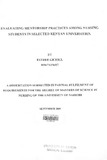| dc.contributor.author | Gichigi, Esther | |
| dc.date.accessioned | 2013-05-23T07:53:32Z | |
| dc.date.available | 2013-05-23T07:53:32Z | |
| dc.date.issued | 2009 | |
| dc.identifier.citation | Masters of science in Nursing | en |
| dc.identifier.uri | http://erepository.uonbi.ac.ke:8080/xmlui/handle/123456789/24665 | |
| dc.description.abstract | Mentorship programs are offered to support students in program completion, confidence building
and transitioning to further education or the work force. However mentoring relationships have
been faced by challenges such as inadequate knowledge and skills, lack of clear policies and
negative attitude. This study aimed at evaluating the mentorship practises among the nursing
students in Kenyan universities and determining their satisfaction with the mentoring
relationships and challenges faced.
The study was a descriptive cross sectional survey that used both qualitative and quantitative
methods to gather information from the study population. The study participants were students
from University of Nairobi (U.O.N) and Kenya Methodist University (K.E.M.U). A sample of
188 students was selected from a total population of 403 in both universities. Pre-testing of the
study tool was done, informed consent and confidentiality maintained.
The data were coded, entered and analyzed using statistical package for social sciences (SPSS).
Presentation of data was done in form of descriptive statistics, frequency distribution and graphs.
Pearsons chi square tests were used to compare the two groups. The tests level of significance
was set at 5%. Results showed that there was a significance difference between mentorship
programmes in the two institutions (X 2= 17.02, d.f=l ,p < 0.001) . Students in K.E.M.U were
more likely to have mentors and to participate in mentoring (X 2= 58.136, d.f=l, p < 0.001).
Fourty four (72%) of the students at K.E.M.U felt that the program had positive impact on
students' development while only 26(21%) at the U.O.N had similar attitude. At K.E.M.U
22(62.1 %) of the students who had been mentored felt that the mentoring relationship met their
expectations, while at U.O.N 8(88.9%) felt so.
To maximize on the benefits of mentorship for both institutions, clear policies and guidelines
should be put in place. Evaluation of the mentorship programs and their impact on students'
development should be done regularly. Further studies on ways to improve mentorship practices
are recommended.
xu | en |
| dc.language.iso | en | en |
| dc.publisher | University Of Nairobi | en |
| dc.title | Evaluating mentorship practices among nursing Students in selected kenyan universities | en |
| dc.type | Thesis | en |
| dc.description.department | a
Department of Psychiatry, University of Nairobi, ; bDepartment of Mental Health, School of Medicine,
Moi University, Eldoret, Kenya | |
| local.publisher | College of Health Sciences | en |

